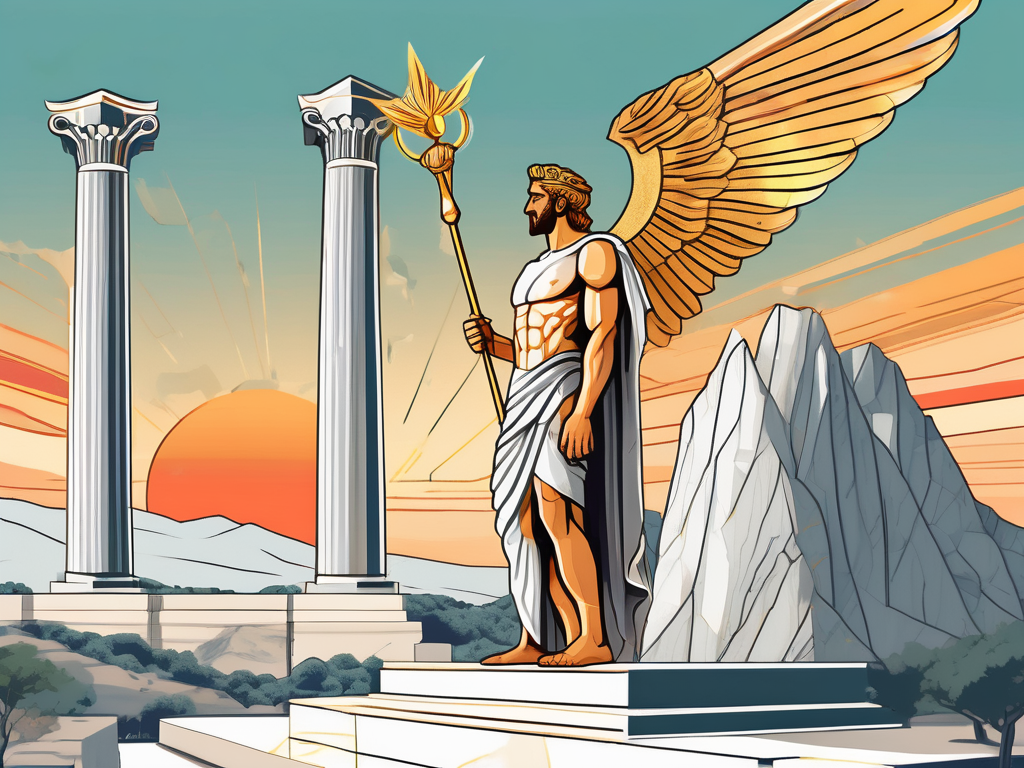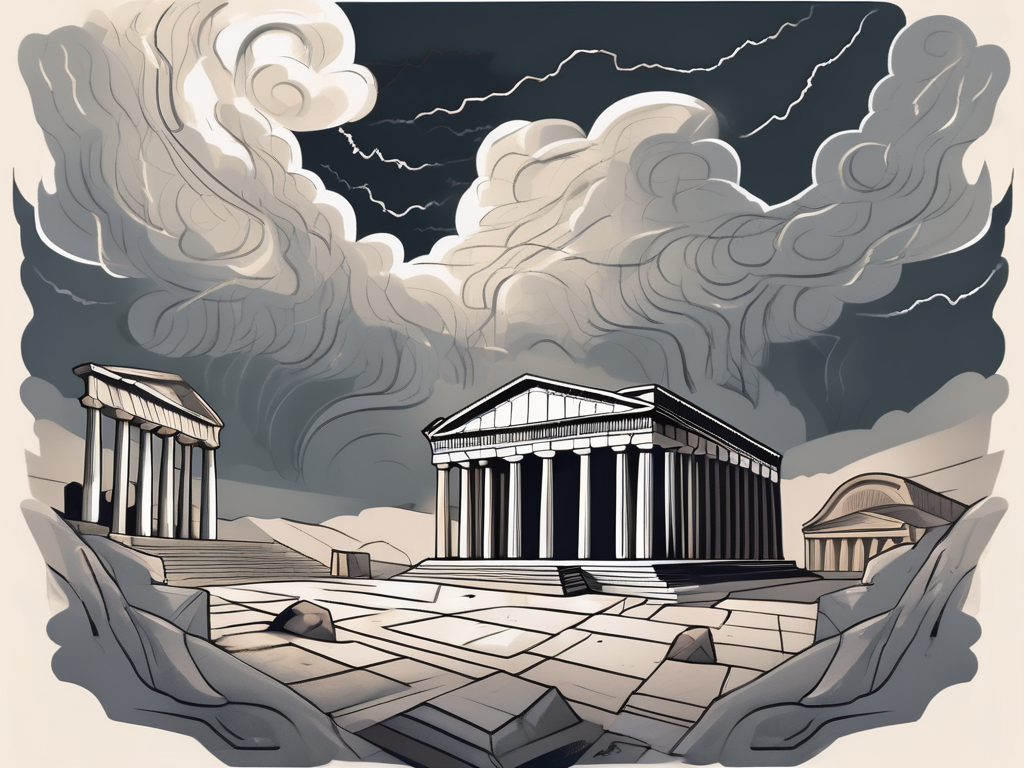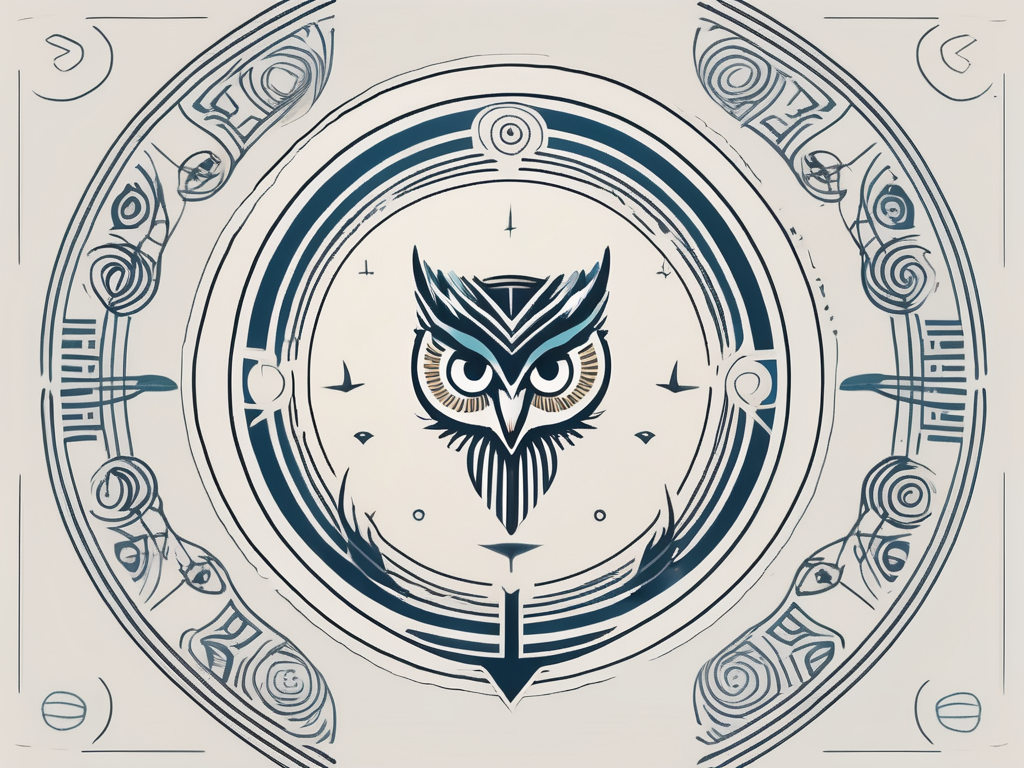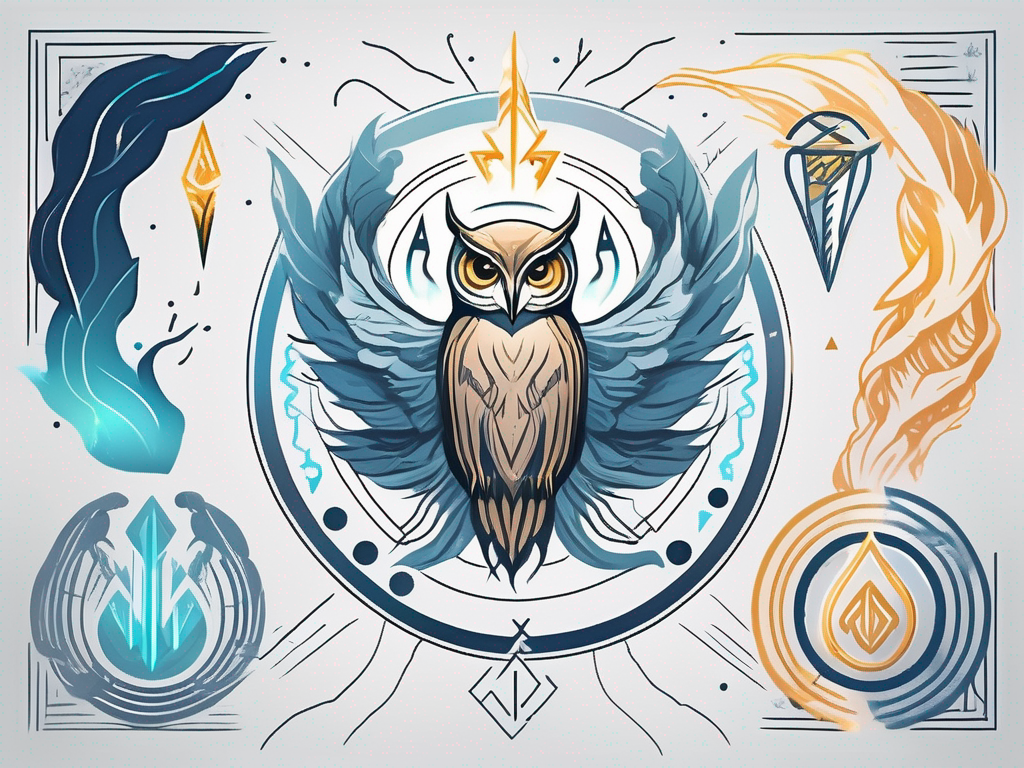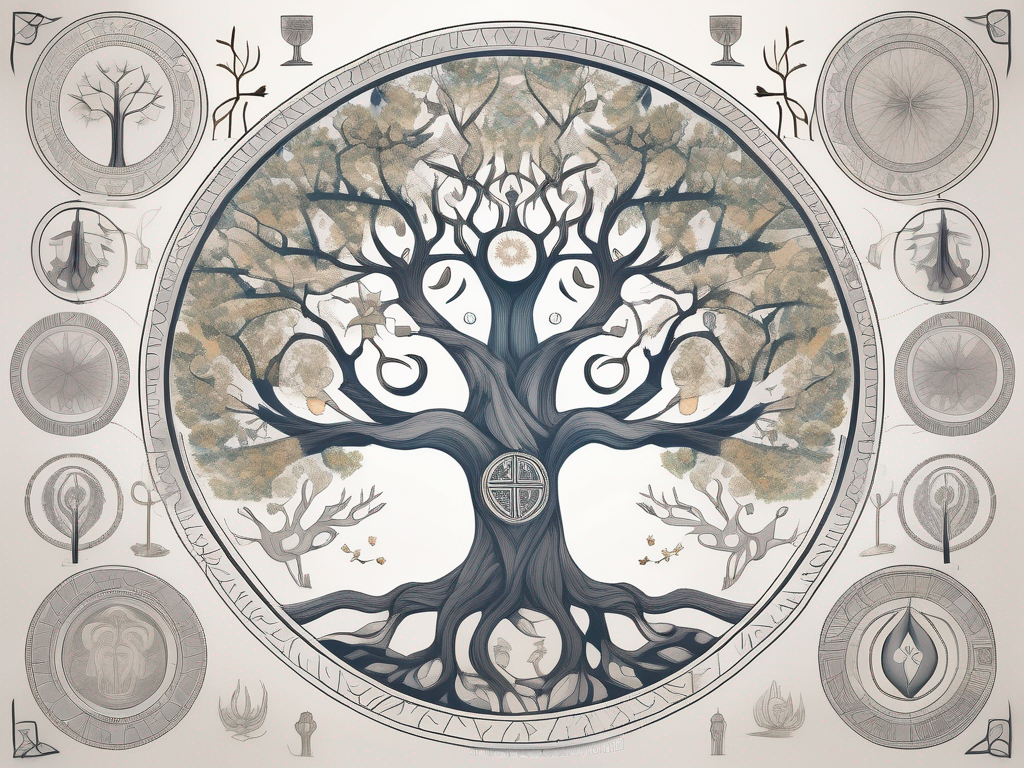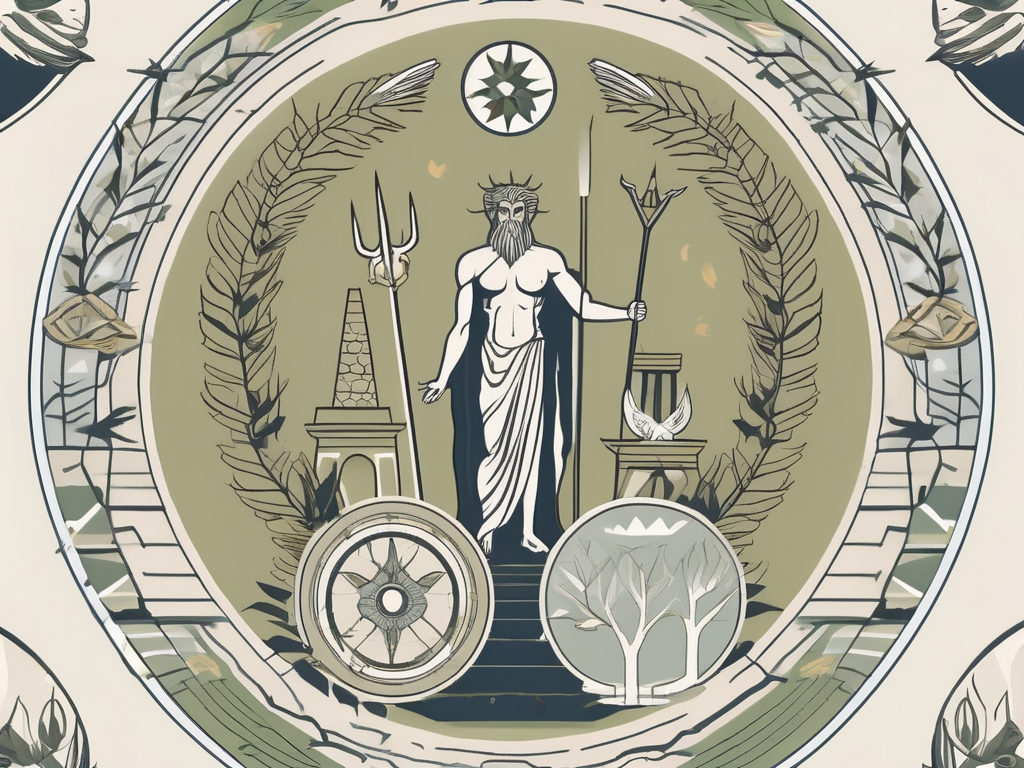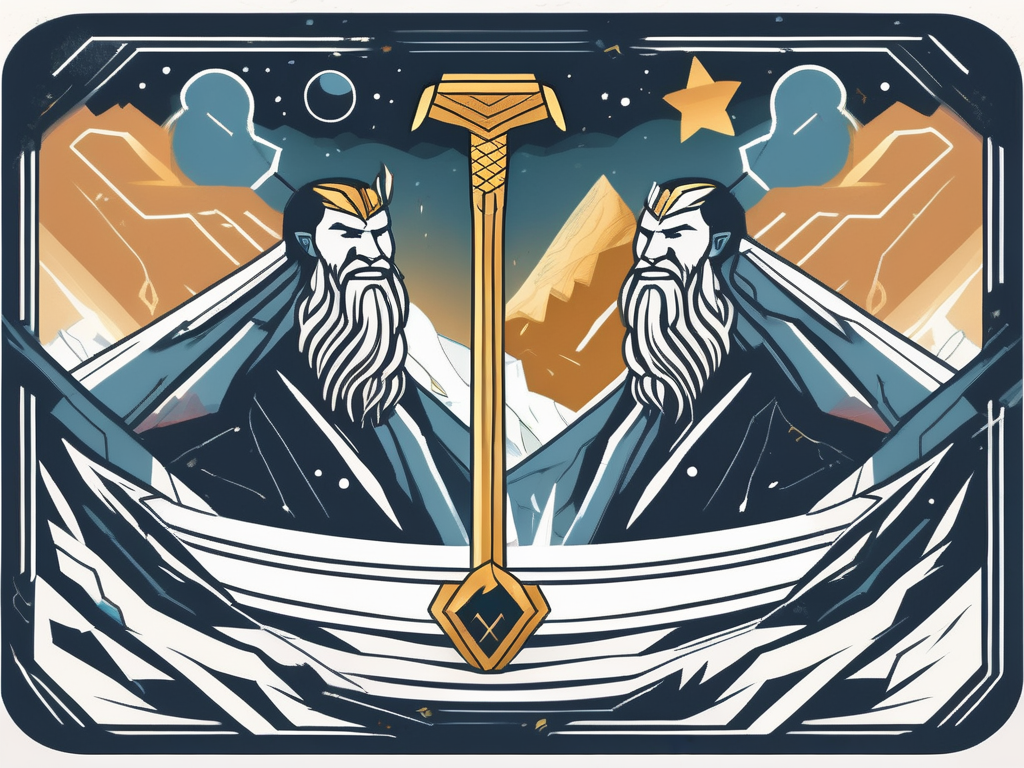Have you ever heard of Zelus? No, not the famous shoe company, but the Greek god. Zelus may not have the same recognition as Zeus or Poseidon, but he is a deity with his own unique powers and legends. In this article, we will delve into the fascinating world of Zelus and uncover the secrets behind his role in Greek mythology.
Understanding the Role of Zelus in Greek Mythology
Before we can fully appreciate Zelus, let’s take a closer look at his origins and his place within the vast pantheon of Greek gods and goddesses.
Zelus, also known as Zelos, was a son of the Titans Pallas and Styx. He was born alongside his siblings Nike, Bia, and Kratos. In Greek mythology, these four siblings personified different aspects of strength and power.
Zelus, with his name meaning “zeal” or “rivalry,” played a significant role in the Greek pantheon as the personification of these qualities. His unwavering dedication and enthusiasm fueled the competitive spirit of individuals, inspiring them to achieve greatness.
As the embodiment of zeal, Zelus was often depicted as a youthful and energetic deity, radiating an aura of passion and ambition. He was known for his relentless pursuit of excellence and his ability to ignite the same fervor in others.
In Greek mythology, Zelus was often associated with the concept of rivalry. He encouraged healthy competition and motivated individuals to surpass their own limits. Zelus believed that through rivalry, individuals could push themselves to reach new heights and unleash their full potential.
Zeal and rivalry were not only essential qualities for mortals but also for the gods themselves. Zelus served as a constant reminder to the deities that they must continually strive for greatness and never become complacent. He encouraged them to challenge one another and push the boundaries of their power.
While Zelus was primarily known for his role in inspiring zeal and rivalry, he also played a part in upholding justice and maintaining order. As the son of Pallas, the Titan of warcraft, and Styx, the Titaness of the Underworld’s river, Zelus inherited a sense of duty and righteousness.
With his siblings Nike, Bia, and Kratos, Zelus formed a formidable team, each contributing their unique strengths to the divine realm. Nike personified victory, Bia represented force, and Kratos symbolized strength. Together, they formed a powerful quartet that embodied different aspects of power and dominance.
As we delve deeper into the fascinating world of Greek mythology, it becomes clear that Zelus played a crucial role in shaping the motivations and actions of both mortals and gods. His presence served as a constant reminder that zeal and rivalry were essential for personal growth and the advancement of society.
The Powers and Abilities of Zelus
What made Zelus truly unique were his powers and abilities, which set him apart from other gods.
Zelus as the God of Dedication and Enthusiasm
Zelus was revered as the god of dedication and enthusiasm. He bestowed upon mortals the desire and drive to pursue their passions and dreams. It was believed that Zelus’s influence could inspire even the most ambitious individuals to go the extra mile in their endeavors.
When Zelus’s energy flowed through the veins of those touched by his divine power, a profound transformation occurred. Mortals experienced a surge of motivation and determination, as if a fire had been ignited within them. Their hearts beat with an unwavering passion, driving them forward in their pursuits.
Legends spoke of Zelus’s ability to infuse individuals with an insatiable hunger for success. Those who were blessed by his presence found themselves consumed by an unyielding desire to excel in their chosen fields. Artists created masterpieces that captured the essence of their souls, athletes achieved unprecedented feats of strength and agility, and scholars delved into the depths of knowledge, uncovering hidden truths.
The Influence of Zelus on Human Emotions and Actions
Zelus not only embodied dedication but also had a profound effect on human emotions and actions. When Zelus’s energy coursed through someone’s veins, they became driven, tireless, and restless, propelling them to achieve greatness in their pursuits.
It was said that Zelus’s touch could awaken dormant potential within individuals, unlocking hidden talents and capabilities. Those who were fortunate enough to experience his divine intervention found themselves surpassing their own limitations, pushing the boundaries of what was thought possible.
Under Zelus’s influence, individuals experienced a heightened sense of focus and clarity. Their minds became sharp and agile, allowing them to navigate the complexities of their chosen paths with ease. They developed an unwavering determination, overcoming obstacles that would have otherwise seemed insurmountable.
Furthermore, Zelus’s presence had a ripple effect on those around the chosen few. His energy radiated outward, inspiring and uplifting others in their own pursuits. It was as if a wave of dedication and enthusiasm washed over communities, igniting a collective drive to achieve greatness.
Throughout history, countless tales were told of Zelus’s impact on the world. From the creation of magnificent works of art to the triumphs of great leaders, his influence was evident in every corner of human civilization. Zelus’s powers and abilities were not only a testament to his divine nature but also a testament to the boundless potential that lies within each and every individual.
The Legends and Myths Surrounding Zelus
Like every other deity in Greek mythology, Zelus had his fair share of legends and myths that captivated the ancient Greeks.
One of the most famous stories involving Zelus is his role in the epic Battle of the Titans. As the Titans clashed with the Olympians, Zelus emerged as a formidable warrior, fighting alongside his siblings. His presence on the battlefield was awe-inspiring, as he displayed an unwavering determination and relentless drive to aid Zeus and his siblings in their struggle for dominance. Zelus’s actions in this battle became the stuff of legends, as his unwavering dedication to the cause left a lasting impression on all who witnessed it.
But Zelus’s significance extended beyond his involvement in the Battle of the Titans. He shared a deep bond with his siblings, Nike, Bia, and Kratos, which made them an unstoppable force in the realm of Greek mythology. Nike personified victory, Bia symbolized force, and Kratos represented power. Together, they formed a formidable quartet that brought triumph to the side they aligned themselves with. Their combined strength and unity were legendary, and their presence on the battlefield struck fear into the hearts of their enemies.
As the myths surrounding Zelus spread throughout ancient Greece, people marveled at his unwavering dedication, his indomitable spirit, and his unbreakable bond with his siblings. These stories served as a reminder of the power and resilience that one could possess when driven by a noble cause. Zelus became a symbol of determination and loyalty, inspiring generations of Greeks to strive for greatness in their own lives.
The Cultural Impact of Zelus in Ancient Greece
Zelus’s influence extended beyond myths and legends. He played a vital role in the cultural and religious practices of ancient Greece.
Ancient Greek society was deeply rooted in a pantheon of gods and goddesses, each with their own unique attributes and domains of influence. Zelus, the personification of zeal and rivalry, held a significant place among these deities. His presence was felt not only in the realm of mythology but also in the everyday lives of the ancient Greeks.
The Worship and Rituals of Zelus
In ancient Greece, Zelus was worshipped and revered for his role in inspiring and fueling ambition. Temples were dedicated to him, and rituals were performed to honor his divine presence. These rituals often involved offerings of incense, flowers, and libations, as well as prayers and songs sung in his honor.
People sought Zelus’s blessings to imbibe the qualities of determination and enthusiasm in their own lives. They believed that by paying homage to him, they could tap into his divine energy and channel it towards their own pursuits. Whether it was in the fields of arts, sports, or politics, the ancient Greeks turned to Zelus for guidance and inspiration.
Zelus in Ancient Greek Art and Literature
Zelus’s impact was not limited to religious practices alone. Artists and writers often depicted him in their works, capturing his essence as the embodiment of zeal and rivalry. His portrayal in ancient Greek art and literature served as a source of inspiration and motivation for countless generations.
In sculptures and paintings, Zelus was often depicted as a young and athletic figure, radiating with energy and determination. His muscular physique and intense gaze symbolized the relentless pursuit of excellence and victory. These artistic representations not only celebrated Zelus but also encouraged individuals to strive for greatness in their own endeavors.
Literary works, such as epic poems and tragedies, also featured Zelus as a prominent character. His presence in these narratives added depth and complexity to the stories, highlighting the importance of ambition and competition in the human experience. Through these tales, the ancient Greeks explored the consequences of unchecked rivalry and the rewards of disciplined zeal.
Furthermore, Zelus’s influence extended beyond the realm of art and literature. His ideals of ambition and competition permeated various aspects of ancient Greek society, including education and sports. The ancient Greeks believed that cultivating a sense of zeal and rivalry was crucial for personal growth and the advancement of society as a whole.
In conclusion, Zelus’s impact on ancient Greek culture cannot be overstated. From religious rituals to artistic representations, his presence was felt in every facet of society. The worship of Zelus and the inspiration drawn from his portrayal in art and literature shaped the values and aspirations of the ancient Greeks, leaving a lasting cultural legacy that continues to resonate to this day.
The Modern Interpretation of Zelus
What about Zelus in today’s world? Although ancient Greek mythology may seem like a distant past, elements of Zelus’s character can still be found in modern literature, pop culture, and society.
Zelus in Modern Literature and Pop Culture
Authors and filmmakers have often drawn from Greek mythology, including Zelus, to craft compelling stories and characters. Zelus’s qualities of dedication and enthusiasm continue to resonate with readers and viewers, reminding us of the timeless human desire to achieve greatness.
The Symbolism of Zelus in Contemporary Society
Zelus’s symbolism extends beyond the realms of literature and entertainment. In contemporary society, he represents the indomitable spirit that drives individuals to pursue their dreams against all odds. Zelus stands as a reminder of the power of dedication and the potential within each of us to achieve remarkable feats.
Unveiling the Mighty Zelus
In conclusion, while Zelus may not be as well-known as other Greek gods, his powers, legends, and cultural impact are no less significant. As the personification of zeal and rivalry, Zelus continues to inspire and motivate individuals to this day. So, the next time you find yourself fueled by determination and enthusiasm, remember that you too possess a spark of the mythical god Zelus within you.
